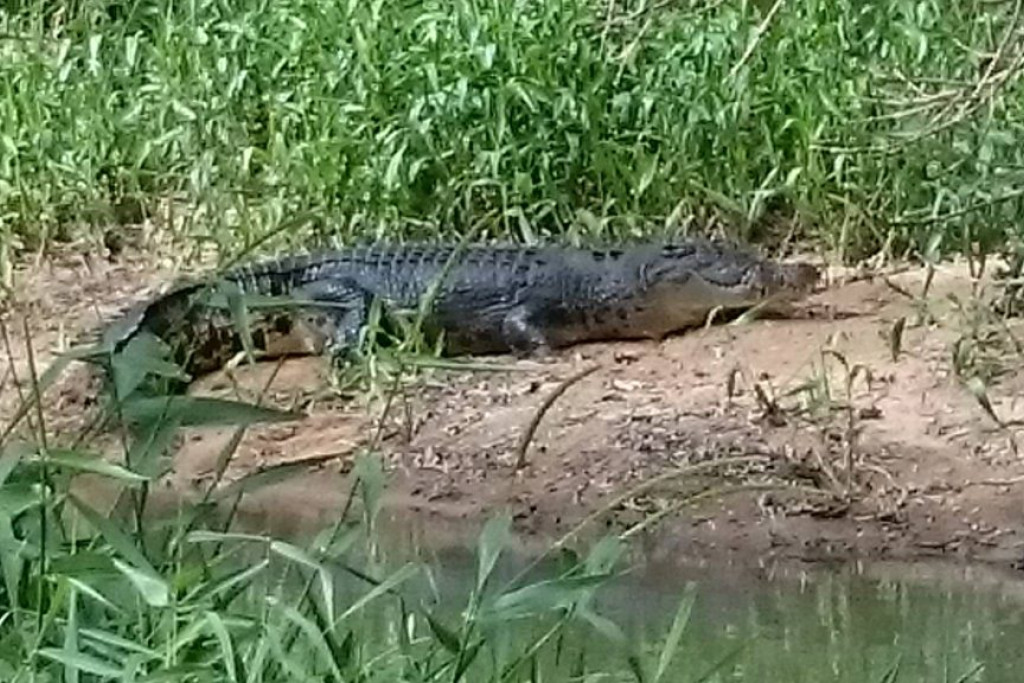General News
2 May, 2019
Saltwater crocodile sighting at Two Mile Creek
THE Department of Environment and Science (DES) were at Two Mile Creek in Biboohra yesterday to place a crocodile trap after two recent sightings of what is believed to be a saltwater crocodile that is approximately 3.5 metres in length.

THE Department of Environment and Science (DES) were at Two Mile Creek in Biboohra yesterday to place a crocodile trap after two recent sightings of what is believed to be a saltwater crocodile that is approximately 3.5 metres in length.
The first sighting was reported on Good Friday; however it wasn’t until there was a second sighting reported on Tuesday that the Department of Environment and Science made the decision to deploy the trap.
A Biboohra Sands Director Sam Musumeci said it was one of his employees who spotted the saltwater crocodile on Tuesday.
“My view is that the Department should be proactive in eradicating crocodiles seen in this area as this is a no tolerance zone,” he said.
“They are an introduced species and we need to get them out of our water systems up here.”
Mr Musumeci said given that crocodiles are naturally an elusive animal, DES should be doing everything to ensure there aren’t any unaccounted for.
“They shouldn’t be waiting for residents to notify them of a sighting,” he said.
“We were told there aren’t any left after there were a couple removed some years ago, but clearly they are still around.”
Brodie Moloney from Top End Crocodile Service said enough is not being done to quell the saltwater crocodile population in Mareeba.
“The saltwater crocodiles in Mareeba along the Two Mile Creek system and into Lake Mitchell are introduced,” he said.
“A nearby crocodile farm that opened about 20 years ago has been losing crocodiles for years.
“Nowadays the farm is very secure, but these animals that have escaped years before hang around the creek system and get flushed into Lake Mitchell every wet season - the habitat in that lake is perfect for crocodiles and they potentially could be breeding which will expand the feral population.”
Mr Moloney noted that the government officials who remove crocodiles around the Cairns area do a great job, however he said it’s a different story up here.
“I have conducted surveys on a few farms now around Two Mile Creek and over the last few years I have estimated that there is around 20-40 individual feral crocodiles in Two Mile Creek and Lake Mitchell,” he said.
“I have also received sighting reports from the upper reaches of the Mitchell River where saltwater crocodiles have never been seen that far upstream.”
Mr Moloney said he would like to see Queensland adopt the Northern Territory’s laws which allows crocodile contractors and landowners to apply for a permit to trap and remove rogue and problem crocodiles.
“In Queensland we can’t do that - there are plenty of people in the crocodile industry who would catch and remove the feral population of salties in Mareeba if they were given a permit to do so,” he said.
“I don’t understand how the department acknowledges the fact that these are feral crocodiles, but does not prioritise these animals for removal, because as time goes on the problem gets worse, and as the animals get bigger, they could potentially be breeding.
“What are the department waiting for - someone’s dog, cow or even a person to be taken?”
A spokesperson for the Department of Environment and Science said crocodiles that pose a threat to human safety are targeted for removal under the Queensland Crocodile Management Plan.
“Under the Queensland Crocodile Management Plan, Two Mile Creek at Biboohra is in Zone F (Atypical Habitat Zone),” the spokesperson said.
“This means that any crocodile found is targeted for removal from the wild, regardless of its size or behaviour.
“DES is unable to determine where the animal came from, but the department monitors all crocodile farms for compliance with their approvals under the Nature Conservation Act 1992.”
The spokesperson said members of the public are encouraged to report crocodile sightings as soon as possible, by calling 1300 130 372.


